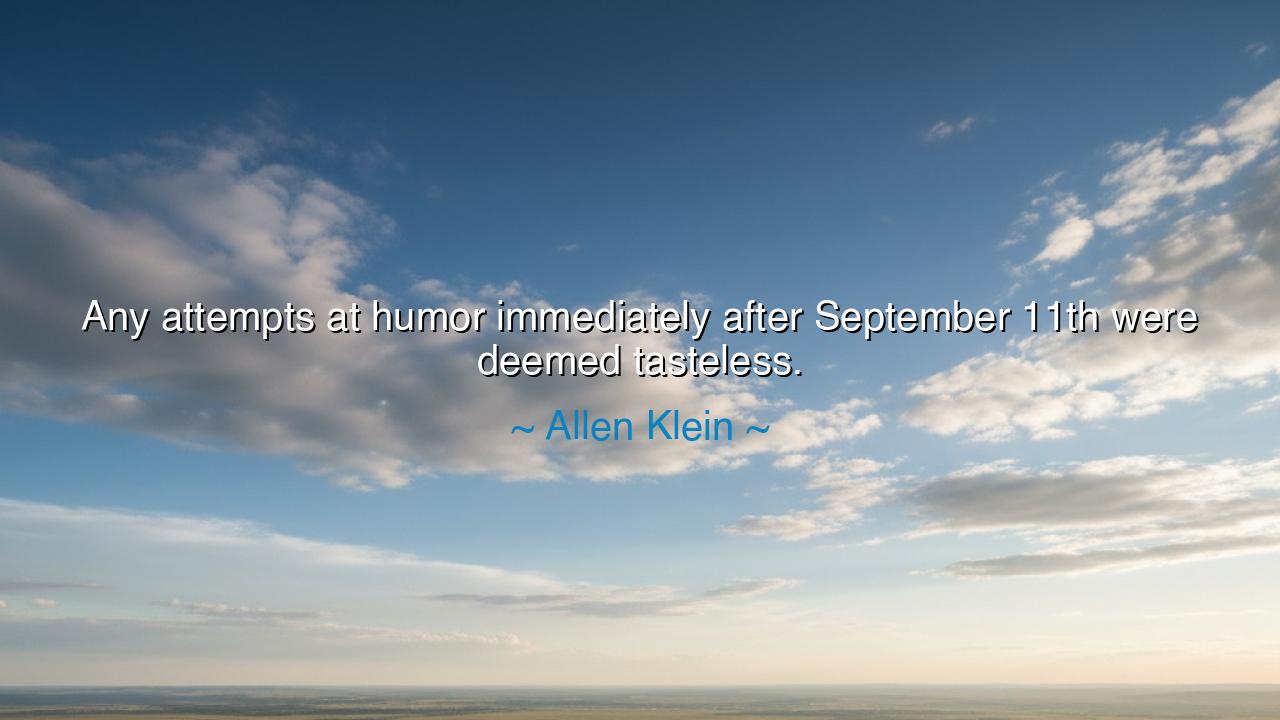
Any attempts at humor immediately after September 11th were






The words of Allen Klein—“Any attempts at humor immediately after September 11th were deemed tasteless”—carry a solemn truth about the fragile balance between grief and laughter, between the wounds of tragedy and the healing power of the human spirit. In these words lies a reflection on a moment in history when the world itself seemed to stop breathing. After the September 11th attacks, when towers fell and thousands of lives were lost, silence became sacred. In that silence, laughter—our most natural human release—felt almost forbidden. Klein’s words remind us that humor, though powerful, must bend before sorrow; that there are seasons when the heart cannot yet bear levity, for it is still learning how to weep.
For humor and grief are twin forces of the soul. Both arise from awareness—one of life’s absurdity, the other of its fragility. In ordinary times, humor helps us endure the weight of existence, allowing us to laugh at our own folly and at fate’s caprice. But in moments of collective suffering, that same humor can appear callous, as though mocking the sacred pain of others. Klein’s observation is not a condemnation of humor itself, but an acknowledgment of the sacred silence that follows great loss—the pause in which the soul gathers its shattered pieces before it can once again smile.
Throughout history, this rhythm between mourning and mirth has repeated. After the Great Fire of Rome, after the Black Death, after wars and revolutions, societies have always entered a time when laughter seemed a betrayal. And yet, in time, it returns—softly at first, then boldly, as the spirit reclaims its will to live. Even in ancient Athens, when tragedy was honored with solemn festivals, comedy followed it on the same stage. The ancients understood that the two were not enemies but companions: grief deepens laughter, and laughter redeems grief. Klein’s words describe the moment when one must yield to the other—when humor must bow before mourning, until the heart is ready to rise again.
Consider the story of Jon Stewart, the American comedian and host, who faced this very dilemma after September 11th. For days, his show remained dark. When he finally returned, he did not begin with jokes but with tears. He spoke, voice trembling, of the devastation and the bravery he had witnessed. Only after acknowledging the pain did he slowly reintroduce laughter—not as escape, but as restoration. Stewart’s example reveals the truth behind Klein’s words: that humor without compassion becomes cruelty, but humor joined with empathy becomes healing. The timing of laughter is sacred; to laugh too soon is to wound, but to never laugh again is to surrender the light entirely.
In saying that attempts at humor were “deemed tasteless,” Klein captures not only public judgment, but also the instinctive reverence of a people in mourning. When hearts are raw, laughter feels like blasphemy. Yet even this reaction speaks to the moral consciousness of humanity—the desire to honor the fallen, to preserve a space untouched by levity. The stillness after tragedy is a form of prayer. And yet, in time, prayer itself must lead back to life, and life inevitably leads to laughter. The art, then, is to discern when silence is healing and when it becomes a cage.
From this truth flows a lesson for all generations: respect the seasons of the human heart. There is a time to mourn, and a time to laugh; a time to be silent, and a time to speak. When others suffer, offer empathy before jest; when wounds are fresh, let your humor sleep awhile, like a seed beneath the earth. But remember also that laughter, when it returns, is not disrespect—it is resurrection. It is the soul’s proof that darkness cannot claim it forever. The true wisdom lies in knowing when to bow and when to rise.
So let these words of Allen Klein be not merely a reminder of one sorrowful moment in history, but a guide for all who live through pain: do not rush to laughter, but do not banish it forever. The heart must first learn to grieve so that it may laugh again without guilt. In the ashes of loss, silence is sacred—but laughter, when it returns, is sacred too. For it proclaims that love still lives, that life still stirs, and that even in the shadow of tragedy, the human spirit has not forgotten how to shine.






AAdministratorAdministrator
Welcome, honored guests. Please leave a comment, we will respond soon